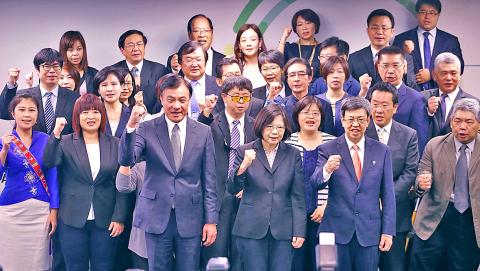The Democratic Progressive Party (DPP) yesterday announced its legislator-at-large nominees, a list which contrasted with past practice as it included a substantial portion of nominees who are not DPP members.
The list of 34 nominees includes 14 who are not affiliated with any political party. Five of the top eight nominees are not DPP members, which means members of the public have a greater chance of winning seats in the legislature in the Jan. 16 elections.
At a press conference in Taipei, DPP Chairwoman and presidential candidate Tsai Ing-wen (蔡英文) said that though the roster is very “non-DPP” on the surface, it fully reflects the party’s beliefs of openness and diversity, thereby allowing for more professional input in the legislature.

Photo: CNA
Later in the day, DPP legislators Cheng Li-chun (鄭麗君) and Joseph Wu (吳釗燮), who have also been nominated for legislator-at-large seats, visited the Central Election Commission and completed the registration for their nominations.
Each nominee would shoulder their responsibility to push for reform, monitor the government and establish communication between the public and the government if they win a seat in the legislature, Tsai said.
“I promise that each and every DPP lawmaker will assume the role of ‘megaphone,’ to broadcast public opinion. Let us achieve an outright majority in the legislature so that we can truly bring about reform,” Tsai said.
Asked about an opinion piece penned by Eric Chen (陳瑞仁) of the Taiwan High Prosecutors’ Office, in which Chen insinuated that Judicial Reform Foundation standing director Wellington Ku’s (顧立雄) acceptance of the DPP nomination proves that “power is enticing,” Tsai said: “I am not sure who he [Chen] is talking about. I believe that Ku is the one who is most familiar with issues about judicial reform. I think that he is an ideal nominee with expansive experience.”
Tsai also confirmed that former Academia Sinica vice president Chen Chien-jen (陳建仁) and herself would register as presidential and vice presidential candidates at the Central Election Commission on Friday.

Alain Robert, known as the "French Spider-Man," praised Alex Honnold as exceptionally well-prepared after the US climber completed a free solo ascent of Taipei 101 yesterday. Robert said Honnold's ascent of the 508m-tall skyscraper in just more than one-and-a-half hours without using safety ropes or equipment was a remarkable achievement. "This is my life," he said in an interview conducted in French, adding that he liked the feeling of being "on the edge of danger." The 63-year-old Frenchman climbed Taipei 101 using ropes in December 2004, taking about four hours to reach the top. On a one-to-10 scale of difficulty, Robert said Taipei 101

Nipah virus infection is to be officially listed as a category 5 notifiable infectious disease in Taiwan in March, while clinical treatment guidelines are being formulated, the Centers for Disease Control (CDC) said yesterday. With Nipah infections being reported in other countries and considering its relatively high fatality rate, the centers on Jan. 16 announced that it would be listed as a notifiable infectious disease to bolster the nation’s systematic early warning system and increase public awareness, the CDC said. Bangladesh reported four fatal cases last year in separate districts, with three linked to raw date palm sap consumption, CDC Epidemic Intelligence

Taiwanese and US defense groups are collaborating to introduce deployable, semi-autonomous manufacturing systems for drones and components in a boost to the nation’s supply chain resilience. Taiwan’s G-Tech Optroelectronics Corp subsidiary GTOC and the US’ Aerkomm Inc on Friday announced an agreement with fellow US-based Firestorm Lab to adopt the latter’s xCell, a technology featuring 3D printers fitted in 6.1m container units. The systems enable aerial platforms and parts to be produced in high volumes from dispersed nodes capable of rapid redeployment, to minimize the risk of enemy strikes and to meet field requirements, they said. Firestorm chief technology officer Ian Muceus said

MORE FALL: An investigation into one of Xi’s key cronies, part of a broader ‘anti-corruption’ drive, indicates that he might have a deep distrust in the military, an expert said China’s latest military purge underscores systemic risks in its shift from collective leadership to sole rule under Chinese President Xi Jinping (習近平), and could disrupt its chain of command and military capabilities, a national security official said yesterday. If decisionmaking within the Chinese Communist Party has become “irrational” under one-man rule, the Taiwan Strait and the regional situation must be approached with extreme caution, given unforeseen risks, they added. The anonymous official made the remarks as China’s Central Military Commission Vice Chairman Zhang Youxia (張又俠) and Joint Staff Department Chief of Staff Liu Zhenli (劉振立) were reportedly being investigated for suspected “serious